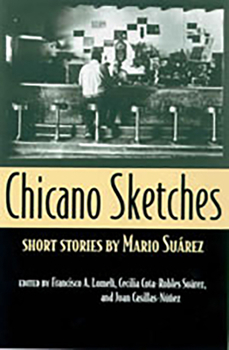Chicano Sketches
Mario Suárez will tell you: Garza's Barber Shop is more than razors, scissors, and hair. It is where men, disgruntled at the vice of the rest of the world, come to get things off their chests. The lawbreakers come in to rub elbows with the sheriff's deputies. And when zoot-suiters come in for a trim, Garza puts on a bit of zoot talk and "hep-cats with the zootiest of them." A key figure in the foundation of Chicano literature, Mario Suárez (1923-1998) was among the first writers to focus not only on Chicano characters but also on the multicultural space in which they live, whether a Tucson barbershop or a Manhattan boxing ring. Many of his stories have received wide acclaim through publication in periodicals and anthologies; this book presents those eleven previously published stories along with eight others from the archive of his unpublished work. It also includes a biographical introduction and a critical analysis of the stories that will broaden readers' appreciation for his place in Chicano literature. In most of his stories, Suárez sought to portray people he knew from Tucson's El Hoyo barrio, a place usually thought of as urban wasteland when it is thought of at all. Suárez set out to fictionalize this place of ignored men and women because he believed their human stories were worth telling, and he hoped that through his depictions American literature would recognize their existence. By seeking to record the so-called underside of America, Suárez was inspired to pay close attention to people's mannerisms, language, and aspirations. And by focusing on these barrio characters he also crafted a unique, mild-mannered realism overflowing with humor and pathos. Along with Fray Angélico Chávez, Suárez stands as arguably the mid-twentieth century's most important short story writer of Mexican descent. Chicano Sketches reclaims Suárez as a major figure of the genre and offers lovers of fine fiction a chance to rediscover this major talent.
Format:Paperback
Language:English
ISBN:0816524041
ISBN13:9780816524044
Release Date:October 2004
Publisher:University of Arizona Press
Length:198 Pages
Weight:0.70 lbs.
Dimensions:0.5" x 6.0" x 9.0"
Related Subjects
Anthologies Contemporary Fiction Hispanic Literary Literature & Fiction Short StoriesCustomer Reviews
1 rating
Early Chicano Fiction Still Resonates
Published by Thriftbooks.com User , 19 years ago
In their introduction to Chicano Sketches, the editors assert that the late short-story writer Mario Suarez "represents a unique case of an early Chicano author who remained faithful to his original purpose of creating a distinctively Chicano literary space." How early? The first eight of the 19 stories included in this collection were first published by the Arizona Quarterly between 1947 and 1950. The "distinctively Chicano literary space" Suarez created was grounded in the harsh realities of a barrio in Tucson called El Hoyo (literally "The Hole") which the editors term "an urban wasteland." Suarez, who was also a journalist, social activist and educator who relocated his family to Southern California in 1958, possessed a sharp eye for quotidian human experience. He populated his "sketches" (his term) with preening pachucos, avuncular barbers, unrepentant womanizers, chisme-loving comadres, clever swindlers and many other examples of humanity. Suarez did not romanticize the Chicano experience; indeed, he acknowledged such social dysfunctions as alcohol abuse ("Cuco Goes to a Party" and "Loco-Chu"), indolence ("Kid Zopilote") and economic struggle ("The Migrant" and "Los Coyotes") while celebrating the beauty of Chicano culture ("Mexican Heaven"), human kindness ("Dona Clara" and "Senor Garza") and the work ethic ("Something Useful, Even Tailoring"). Quite often, Suarez relied on biting irony and comedic juxtapositions to illustrate his characters' vices and virtues. No collection of Chicano literature will be complete without this volume. [The full version of this review first appeared in Southwest BookViews.]





